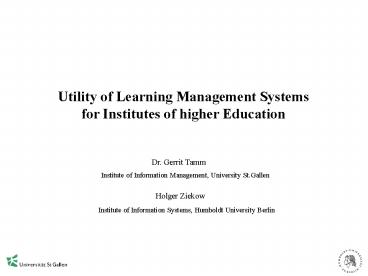PowerPoint-Pr PowerPoint PPT Presentation
1 / 23
Title: PowerPoint-Pr
1
Utility of Learning Management Systems for
Institutes of higher Education
Dr. Gerrit Tamm
Institute of Information Management, University
St.Gallen
Holger Ziekow
Institute of Information Systems, Humboldt
University Berlin
2
Motivation
- Need for improvements in education
- Need for managed distribution of information
- LMS are seen as a chance for institutes of
higher education - Need for a generic, holistic approach for the
evaluation of LMS
3
Structure
- Conceptual framework
- Definitions
- The Analysis of Processes
- Evaluation
- Strategy
- Lecturers Perspective
- Students Perspective
- Practical Test
- Conclusion
4
Definition of LMS
A Learning Management System is software that
automates the administration of training events.
All Learning Management Systems manage the log-in
of registers users, course catalogs, record data
from learners, and provide reports to management.
There used to be a distinction between Learning
Management Systems and more powerful Integrated
Learning Management Systems. That distinction has
now disappeared. The term Learning Management
System is now used to describe a wide range of
applications that track student training and may
or may not include functions such as authoring,
classroom management, competency management,
knowledge management, certification or
compliance training, personalization,
mentoring,chat, discussion boards.
A Learning Management System is software that
automates the administration of training events.
All Learning Management Systems manage the log-in
of registers users, course catalogs, record data
from learners, and provide reports to management.
There used to be a distinction between Learning
Management Systems and more powerful Integrated
Learning Management Systems. That distinction has
now disappeared. The term Learning Management
System is now used to describe a wide range of
applications that track student training and may
or may not include functions such as authoring,
classroom management, competency management,
knowledge management, certification or compliance
training, personalization, mentoring, chat,
discussion boards.
A Learning Management System is software that
automates the administration of training events.
All Learning Management Systems manage the log-in
of registers users, course catalogs, record data
from learners, and provide reports to management.
There used to be a distinction between Learning
Management Systems and more powerful Integrated
Learning Management Systems. That distinction has
now disappeared. The term Learning Management
System is now used to describe a wide range of
applications that track student training and may
or may not include functions such as authoring,
classroom management, competency management,
knowledge management, certification or compliance
training, personalization, mentoring, chat,
discussion boards.
5
The Analysis of processes
Administration of studies
Academic programs
Secondary Activities
Curricular activities
Central administration
Evaluation
Archiving
Preparation of information
Distribution of information
Primary Activities
6
Strategy of the Evaluation
Analysis of Processes
Practical Tests
7
Empirical Studies
- Questionnaire addressing Lecturers
- General conditions for the introduction of LMS
- Investigation of psychological aspects and
peculiarity of processes - Questionnaire addressing Students
- Students need for LMS
- Most desired functions
8
Empirical Study addressing Lecturers
- All professors and scientific assistants of
the Humboldt-University of Berlin addressed - About 1800 persons were contacted
- 208 lecturers responded, covering 11,5
9
Current peculiarity of processes
Lecturers
frequent use
seldom use
10
Current peculiarity of processes
Lecturers
frequent use
seldom use
11
Current peculiarity of processes
Lecturers
frequent use
seldom use
12
Current peculiarity of processes
Lecturers
frequent use
seldom use
13
Current peculiarity of processes
- Use of modern technology polarizes the
lecturers - The frequency of use is higher for simple
functions - Many lecturers are already using modern
technology in a number of processes
14
Usage of Google
Usage of information portals
100
45
Lecturers
Lecturers
seldom use
seldom use
frequent use
frequent use
Digital slides in lectures
Submission of homework per e-mail
25
30
Lecturers
Lecturers
seldom use
0
frequent use
100
15
Psychological Aspects
- General attitude towards LMS
- Expectations
- Fears and prejudices
16
I will use LMS frequently
LMS is a good thing university should put an
effort on
40
50
Lecturers
Lecturers
agreement
disagreement
agreement
disagreement
17
Psychological Aspects
- General positive attitude towards LMS
- Concerns regarding usability
- Concerns regarding time
18
Empirical Study addressing Students
Results
- Most desired functions
- preparation tests available online
- detailed information about courses
- grades of the exams online
- books and articles in hyperlinked version
- online corrected solution of the exam
- Focus on simple functionality
- Overall high demand for internet based support
19
Practical Test
- Seven institutes of the HU participated in the
test - Five Systems where available for the testers
- Blackboard
- Oracle iLearning
- WebCT
- imc CLIX Campus
- Sumatra System 3
- Systems where provided as ASP-solutions
20
Practical Test
- Four of seven institutes had to stop testing
early - getting familiar with the system took too much
time - lecturers where unable to integrate the system
in the lessons - The other institutes complained about serious
problems - usage appeared to be complicated
- getting familiar with the system was very time
consuming - none of the testers recommended the used system
21
Conclusions
- General conditions for LMS are good
- Just providing an LMS is insufficient
- Functions do not easily match with universities
processes - Three aspects appeared to be most critical
- Occupation of Time
- Usability
- Integration in lectures (using LMS for desired
functions)
22
Conclusions
- LMS is not just a matter of software
- Holistic information management is needed
- Successful introduction needs support
- Training
- Road shows for information
- Support while introduction (matching with
processes) - Support for usage-problems
- Technical service
- LMS are a chance for central institutions
23
Thank you for your attention
Holger Ziekow Institute of Information
Systems Humboldt-University of Berlin 10178
Berlin, Germany E-mail ziekow_at_wiwi.hu-berlin.de
Dr. Gerrit Tamm Institute of Information
Management University St.Gallen CH-9000
St.Gallen, Switzerland E-mail gerrit.tamm_at_unisg.c
h

